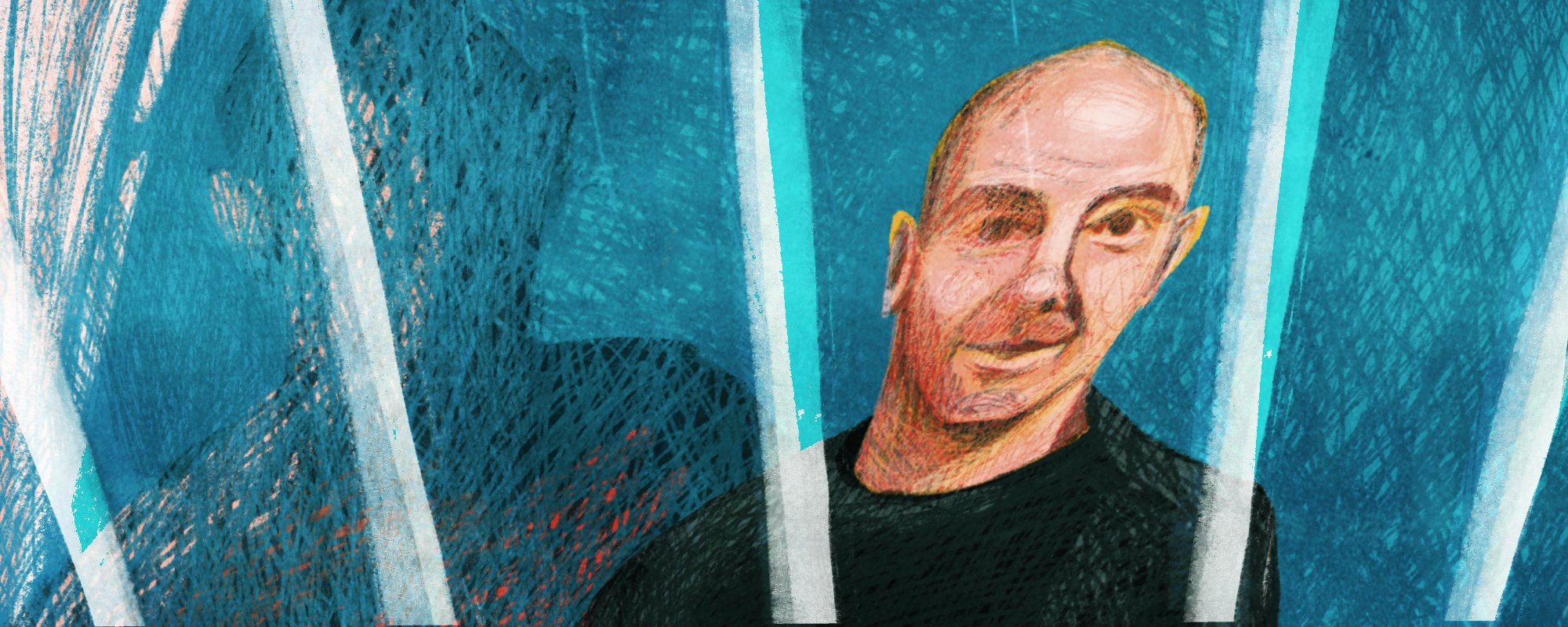On July 15th, the politician Andrei Pivovarov was sentenced to four years in a general regime colony. He was found guilty of carrying out the activities of an «undesirable organization». The case was based on the opposition leader’s Facebook posts, which the investigation linked to Mikhail Khodorkovsky’s «Open Russia» (considered «undesirable» by the Russian government). OVD-Info tells the story of Pivovarov.
Pivovarov showed no dismay as he listened to the verdict, although many of his friends and associates were not there. Some had emigrated, and some could not attend because the defense’s appeal to move the trial to Pivovarov’s home St. Petersburg had been refused.
Krasnodar airport had been closed since February 24th, like many other airports and airfields in the south of Russia, and the fastest alternative route through Sochi takes 15 hours. Because of this, many of Pivovarov’s supporters were not able to come, including his elderly mother — the journey would have been physically impossible at her age.
Open Russia’s ex-coordinator Tatiana Usmanova, one of those who were able to get to the Leninsky district court of Krasnodar, says: «I also don’t spend all my time in Russia now, Andrei dissuaded me from flying. He wrote the same letters to friends in exile. When we entered the courtroom, we saw that Andrey, as always, was keeping up cheerfully, looking good. And because he is under arrest in Krasnodar he got this beautiful, even tan».
According to Usmanova, the reading of the verdict took two hours — and while the judge was bumbling monotonously the prosecutor was scrolling through his smartphone. Since the judge had prohibited recording the verdict on video, the bailiffs were vigilantly watching everyone’s screens throughout the meeting to check if anyone was secretly filming.
Not the heart of a party but its brains
Pivovarov was born in 1981 in the heart of Leningrad in the family of a researcher. The «Solidarity» trade union was on strike in Poland at that time, the USSR was becoming freer, the Leningrad Rock Club had recently opened.
«In 2009, he dragged me into a political crowd. He said, «Dude, politics is much more interesting than football,» recalls Andrey Pivovarov’s childhood friend Lev Dmitriev, together with whom they went to cheer for «Zenit».
In addition to football matches, Pivovarov and Dmitriev went to Alisa [famous Russian hard rock band] gigs. «He wasn’t the heart of a party, he was its brains. I would come up with a „what“, and he would do the „hows“ and „whys“. I think he is more of an introvert by nature, a modest person,» recalls Dmitriev.
Pivovarov became interested in politics while studying at the Academic Gymnasium at St. Petersburg State University. Later, already a student, he attended political science courses and the «Foros» forum, held by the Sergei Markov «Institute for Political Studies» (not yet Putin’s confidant at the time).
Role-play exercises at the forum revealed one of Pivovarov’s main strengths: his ability to work effectively with very different people. He would play the part as the head of the election headquarters during these sessions.
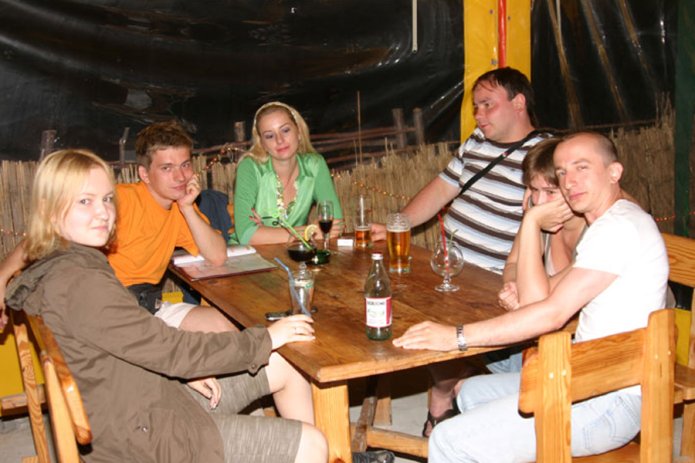
In 2003, Pivovarov joined the liberal conservative party «Union of Right Forces», created by Boris Nemtsov, Sergei Kiriyenko and Irina Khakamada. Later he because a member the youth democratic movement Oborona (Russian for «defense»). Maxim Reznik, a former deputy of the Legislative Assembly of St. Petersburg, says:
«It was the time, as I call it, of the non-parliamentary democratic movement. I had recently become the chairman of the Yabloko party in St. Petersburg, and that’s how Andrey and I met. Our first conversation took place on his initiative: «Maxim Lvovich, let us swim on our own. You are such an experienced politician, your authority domicates 'Defense'.» I replied: «If you want to swim, buy yourself a swim cap and go to the pool. We do politics here.»
Reznik recalls that he did not like Pivovarov at first, as it seemed to him that the young politician was too focused on competition within the opposition: «He had some kind of excessive focus on intrigues. Always concerned with who will vote for whom… Involved in this partisan, intraspecies struggle. Making the protest actions together, but keeping the political courses parallel.»
In 2006, Andrei Pivovarov, then a graduate student at the Faculty of Economics of St. Petersburg State University, was already leading the city branch of the movement «Russian People’s Democratic Union» (RNDS), founded by the former Prime Minister of the Russian Federation Mikhail Kasyanov. Pivovarov organized various protest actions and educational events on behalf of the RNDS.
Together with Lev Dmitriev, whom he introduced to politics, they went to the Strategy-31’s rallys in St. Petersburg.
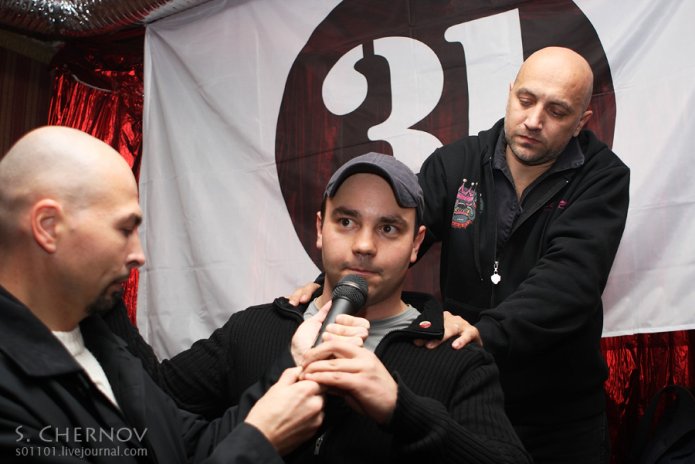
At the same time, Pivovarov was also working on a few businesses. He ran a clothing store «Three Suns», and opened a cheekily named a small brewery (Pivivar means «brewer» in Russian), but later sold it and in 2012 opened a bar called Svoboda («Freedom»).
«We needed a place where we could come after protests, hold debates, discussions, such concepts as „Open Space“ did not exist yet,» recalls Pivovarov’s friend Andrey Davydov.
In the Freedom bar, visitors were greeted by portraits of Che Guevara and banners demanding fair elections or Nemtsov’s books, and could order Proletarian beer and a Greedy cocktail, nicknamed after the then governor of St. Petersburg Georgy Poltavchenko. And the password from the WiFi was putinvor («Putin is a thief»). Lectures, discussions and debates took place in this space. The pro-government «Young Guard of United Russia» would send sent underage activists there to buy alcohol and discredit the bar.
Eight months later, Freedom was closed: the institution turned out to be unprofitable.
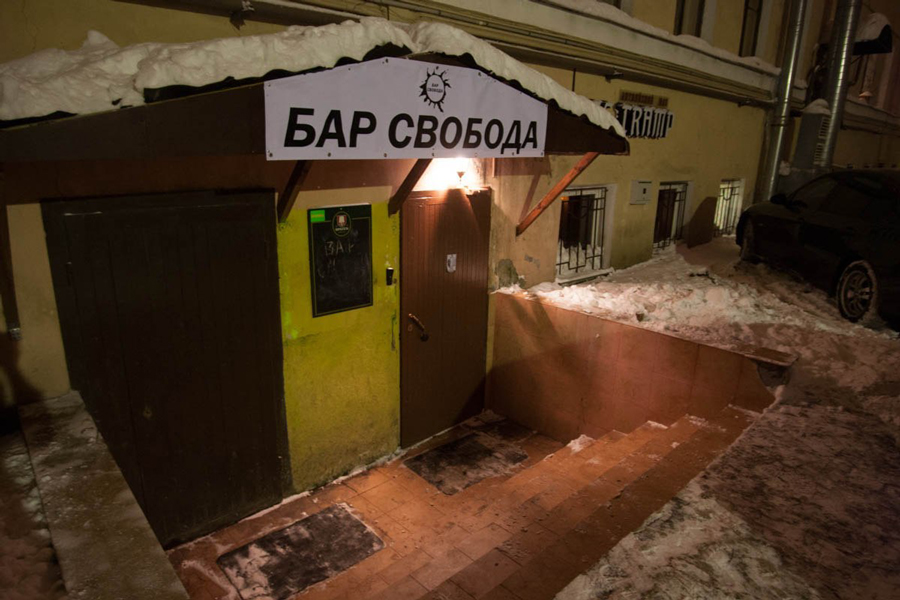
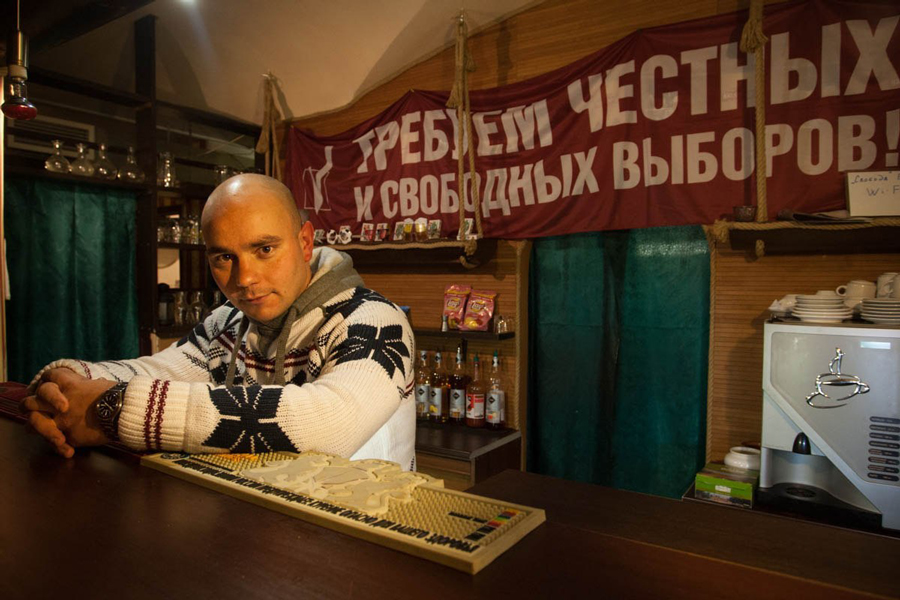
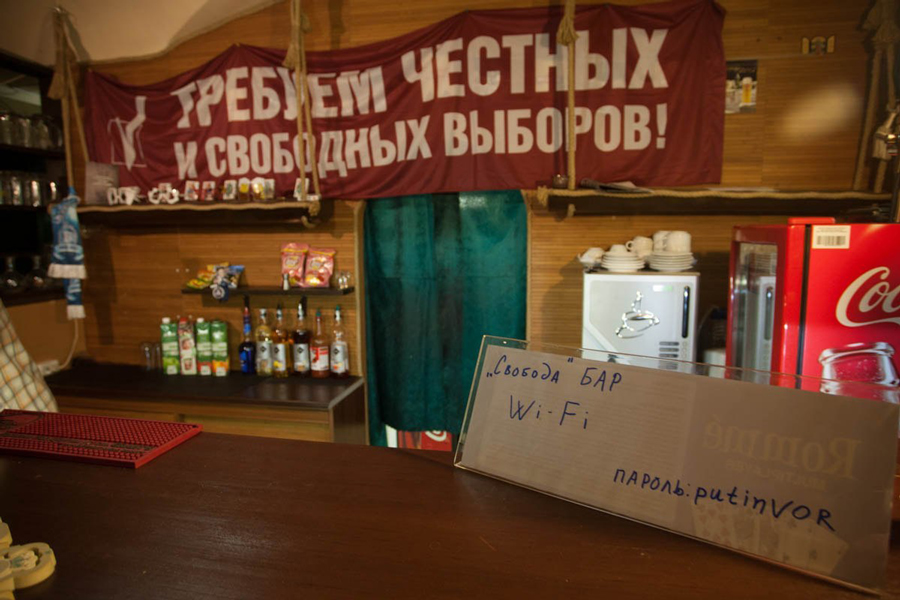
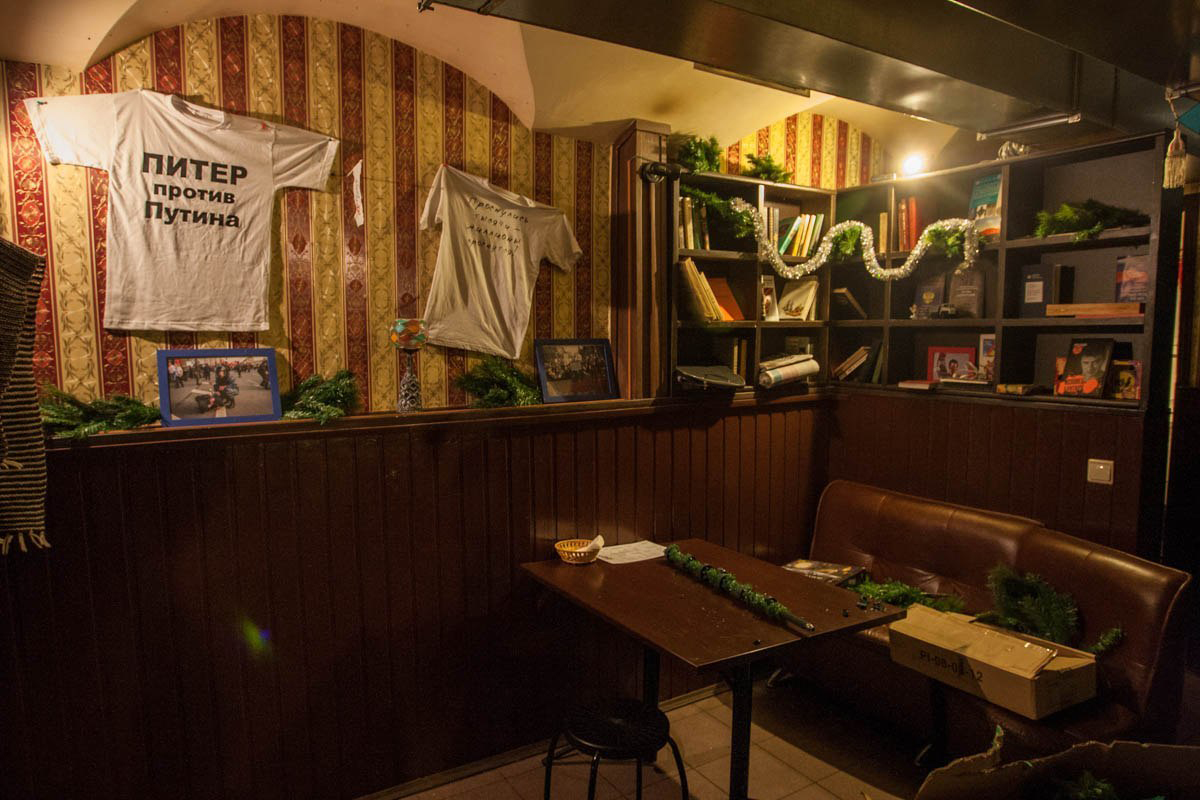
Later, the RNDS joined the center-right «People’s Freedom Party» (PARNAS), founded in 1990 by Mikhail Kasyanov, Boris Nemtsov and Vladimir Ryzhkov. In 2011 Pivovarov became the chairman of the St. Petersburg branch of the party. In the wake of the protests against the results of the Duma elections, Pivovarov became a member of the «Coordinating Council of the Opposition.»
«Before the „Coordinating Council of the Opposition“, a lot of what Andrei did was lighthearted and small-scale, targeting younger people perhaps., He was also spending more time in business. , But then everything became serious, he went full on into politics,» recalls Alexander Shurshev, a former member of Defense.
Kostroma
In 2015, Pivovarov headed to the election headquarters of the politician Ilya Yashin in the elections to the Kostroma Regional Duma. By this time they had been friends with Yashin for ten years, since Defense’s days. During that campaign, for the first time, law enforcement became seriously interested in Pivovarov.
According to both his friends and colleagues in politics, Pivovarov actually tended to be quite cautious as a politician. This is confirmed by the former press secretary of «Open Russia» Natalia Gryaznevich, as well as by the former chairman of «Open Russia» Alexander Solovyov.
«He can bluff in a conversation with an opponent, persuade them, but what makes one wary of Andrei is his adventurism. He is certainly very passionate though. In general, he tried for a long time to decide who he was: a politician or a political strategist. He was trying to do both for a long time,» recalls Solovyov.
At the same time, according to the ex-mayor of Yekaterinburg Evgeny Roizman, Pivovarov is certainly more of a politician:
«Political technologists always push people into politics, but Pivovarov is able to work on his own terms. I have talked to him, and I understand how local self-government works. Andrei also understands it well, he is interested in the nuances of working on site, working directly with people.»
Oleg Kozlovsky, a former colleague of Pivovarov in the Defense movement, and now an employee of the human rights organization Amnesty International, recalls that it is in Pivovarov’s nature to organize but stay on the sidelines — even after becoming more of a public figure in the recent years.
«Andrei never tries to get into the spotlight, he doesn’t like too much attention Maybe that’s why so few people in Russia have heard of a politician called Andrei Pivivarov?» says Kozlovsky.
Nevertheless, during the election campaign in Kostroma, everyone’s eyes were exactly on Pivovarov.
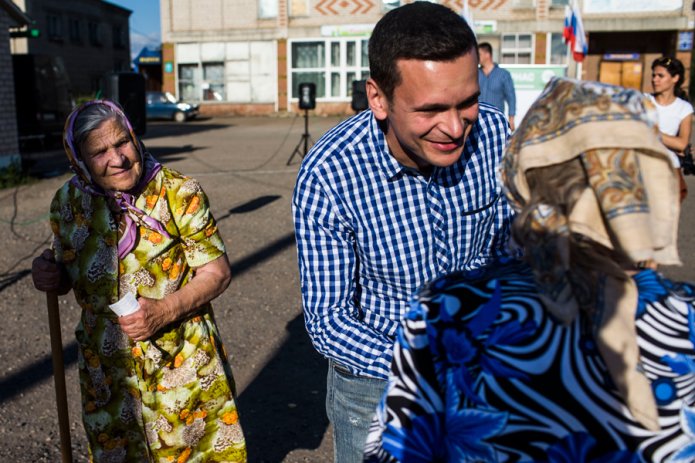
In order to register as a candidate for elections in Russia, it is necessary to collect a certain number of signatures, whose authenticity is then verified by the electoral commission using f the Ministry of Internal Affairs’s databases. Practice shows that these databases contain errors, but courts more often, contrary to common sense, side with election commissions — if it says, for example, «Daria Timurovich» in the database, then they consider it to be the case.
Prosecution argued that Pivovarov had decided to protect himself from such «mistakes» and bribed a policeman to give him access to the database, so that he could check the signatures in advance. Pivovarov did not plead guilty and was placed in a pretrial detention center. His elderly mother’s apartment in St. Petersburg was raided and searched. Memorial, a Russian human rights organisation, declared him a political prisoner. After the end of the election campaign, Pivovarov was released on bail.
The case received country-wide publicity, and Putin personally commented on it. Eventually, the court sentenced the politician to a fine of two million and 400 thousand rubles. Then, because of the time served in the pretrial detention, the amount was reduced to one and a half million, and later, after an appeal, to one million.
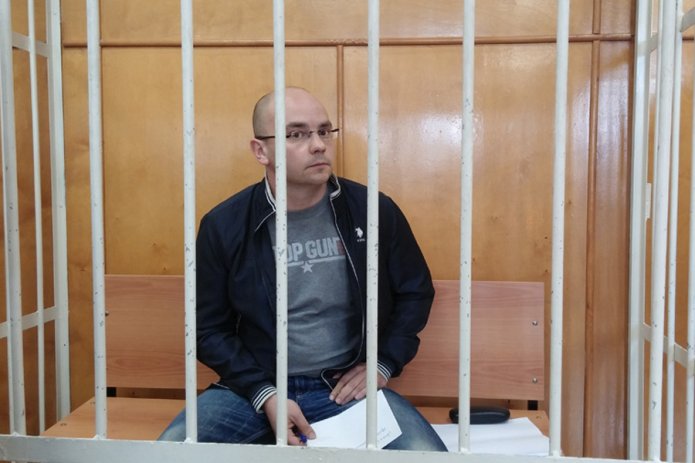
«It seems to me that it was after Kostroma that Andrei took up his health, became interested in sports, » recalls Pivovarov’s friend Andrey Davydov.
After the experience of the pretrial detention center, Pivovarov lost a lot of weight, began to look more athletic. Once again behind bars in 2021, he shares his workout routine.
Former deputy Mikhail Reznik recalls that from some point Pivovarov started shaving his head, which made people would confuse him with the staff of the Center for Countering Extremism:
«When I met my wife, I had this hairstyle, as my wife calls it, „lake in the forest.“ So my wife persuaded me to shave my head, and then Andrei — he was also losing his hair. And then he started looking really intimidating… I remember coming the train station to meet [the politician Yevgeny] Roizman during the protests after the pension reform. Andrei and I were laughing then, because we were both in leather jackets, bald, and the staff of the Center for Countering Extremism were screwing around nearby, also bald and in leather jackets. So Roizman was met by four suspicious types at once.»
According to the former coordinator of «Open Russia» Tatiana Usmanova, it was Roizman who got Pivovarov into sports, and running in particular. In the «Open Russia» office, Pivovarov gave everyone grapefruit juice to drink, encouraging them to run, lose weight and maintain a healthy lifestyle.
The St. Petersburg School of Falsifications
Many friends and acquaintances of Pivovarov speak of him as an honest and intelligent person who constantly wants to help everyone and cannot sit still. They usually consider him more of a practitioner than a theorist.
«Once I tried to rent an apartment in Moscow and got scammed. Pivovarov just came and talked to them, as they say, „man to man“ and decided everything, » recalls Natalia Gryaznevich.
She says that such spontaneous behavior — to jump in, help his friends and solve the problem— is very much in the spirit of Pivovarov.
As a St. Petersburg politician, Pivovarov was, of course, brought up by the relentless school of local elections. St.Petersburg is known is a city where independent candidates routinely face rude behavior in election commissions, are thrown out of polling stations by force, or called police on. There are cases when people were threatened with a saw, a fire extinguisher and, of course, cases of them being beaten. Election committee chairmen once had to run away from windows with documents on the election night, and there are occasions when politicians resorted to hiring bands of migrants from the Caucasus or far-right groups for protection. Pivovarov had to deal with all this at city election campaigns of different levels.
«Andrei is a lot of fun. He is a persistent and reckless fighter in the elections, we are not used to this in Moscow. Pivovarov, on the other hand, is in his element here. Somehow he is always able to lead the team through these trials. He himself will go to from door to door to collect signatures and then defend them. He is really in touch with reality. He understands that our country is not only the center of Moscow», says Tatiana Usmanova, a former coordinator of «Open Russia».
Evgeny Roizman recalls how in 2017 Pivovarov’s laptop was stolen from his car — and he managed to solve this case himself. He brought all the evidence to the police and asked them to find the criminal. The police refused, saying they needed to prepare for the upcoming protesta. Pivovarov got angry and criticized the Interior Ministry on Facebook. Law enforcement officers considered that the post discredited their reputation, and sued, but lost the case spectacularly.
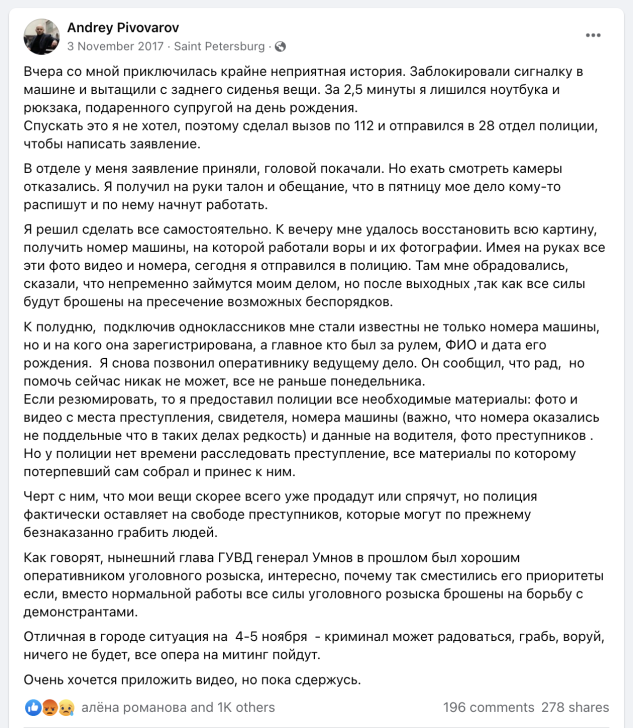
Translation of the post:
Yesterday an unpleasant story happened to me. They blocked the car alarm and dragged out the things from the backseat. I’m 2.5 minutes I lost my laptop and the backpack, given to me by my wife for my birthday.
I didn’t want to let this go so I called 112 and went to the 28th police precinct to write a statement.
The policemen did not take my statement in. But they also refused to drive to watch the street camera recordings. I received a receipt of admission and a promise, that on Friday my case would be assigned to someone and they would start working on it.
I decided to do everything on my own. By the evening I could reproduce the entire picture, and get the license plate of the car that the thieves were driving and their pictures. Having all these photos, videos, and numbers, I came to the police. They were happy to hear that and said they would definitely start working on my case, but after the weekend as currently, all the forces are focused on preventing the possible disorders during the protests.
By noon, by asking a favor from an old classmate I did not only know the license plate but also who it is registered on and, most importantly, who was driving it, their full name, and date of birth. I called again the officer in charge of my case. He said he was glad but couldn’t help me in any way, not before Monday. To sum up, I provided the police with all the needed evidence: photo and video materials from the crime scene, witnesses, license plate (they were not fake which is rare in such cases), information on the driver, photos of the thieves. But the police do not have time to investigate a crime, where all the evidence was already brought to them by the victim.
The hell with it, that by this time my possessions will be most likely sold or hidden but the police literally let the criminals walk free and keep robbing people with no consequence.
Word is, the current head of the Moscow City Police general Umnov used to be a good criminal investigator. Interesting why his priorities shifted if now all the forces of CID are focused on the struggle against protestors.
Great situation in the city for 4-5 November: the criminals may celebrate, rob and mug because all the police officers will be going to protests.
I’m really tempted to upload the video but I will hold it for now.
«He totally gave them a masterclass! In general, Andrei is always learning. He is absolutely fearless, and he is absolutely sure he is right. He is the only person in the opposition who knows how to build good relations with everyone, and whom everyone likes. I was always wondering how he managed to become this moderator figure for such different people. His strength comes from the fact that he is able to push aside contradictions and look for common ground without sacrificing his principles. That’s a rare gift for a politician, » says Roizman.
Pivovarov’s former colleague in «Open Russia», Maria Kuznetsova, recalls another story: one day, a relative of Pivovarov, trying to sort out her pension, became a fraud victim when she was persuaded to pay the criminals «for legal services». Pivovarov came to their office, talked to them, realized that it was pointless, and called the police. While waiting for law enforcement officers, the scammers googled his name and decided to peacefully return the money.
«Andrey is a samurai. He lives according to this principle: «Go for it after thinking it through. Don’t think too much after going for it», says Pivovarov’s friend, lawyer Dmitry Grabatov.
«Open Russia» is undesirable
In 2017, Pivovarov actively supported the presidential election campaign of opposition politician Alexei Navalny and participated in the January protest «Voters' Strike» in St. Petersburg, for which he was sentenced to 25 days of arrest.
In spring, Pivovarov participated in protests in defense of St. Isaac’s Cathedral in St. Petersburg — the authorities were going to give it to the ROC.
«I didn’t like Andrey for a long time, and even less so the people around him. Many people could say the same about me, of course, but you become more tolerant over the years. I don’t even want to waste time on details, this is one of the reasons for the current situation. I don’t even want to think about it. But somewhere after 2017, after the protests in defense of St. Isaac’s Cathedral, this enmity disappeared and we began to communicate better. Now I consider him my colleague fully, unconditionally, » says Reznik.
In the same year, before the presidential elections of the Russian Federation, «Open Russia» held a protest «Fed up». Pivovarov received a fine of 18 thousand rubles.
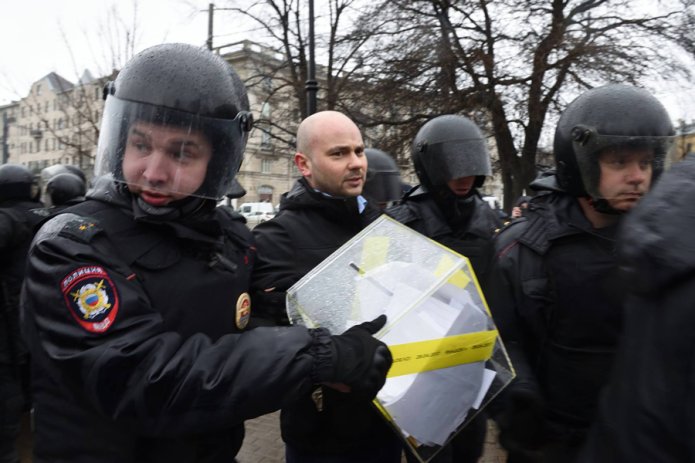
In 2018, Pivovarov was elected chairman of «Open Russia». In 2019, it was reregistered as a movement rather than organization, and Pivovarov became its executive director.
«For many years, Russian society has been discouraged by the authorities from following politics, participating in politics, in other words, from living in their country. The people are consciously, systematically plunged into apathy, into a heavy lethargic sleep. And those who do not agree to fall asleep, who want to remain citizens, have their own opinion, are prosecuted, imprisoned, forced out of the country, intimidated. People in uniform are sure that by filing cases they are protecting the country, and also advancing their career and earning some extra pay. But what they are really doing is nailing the coffin of our future,» Pivovarov said during one of his court appearances in 2022.
When «Open Russia» was proclaimed an undesirable organization, the police started constantly raiding the offices and apartments of the movement´s participants. Formally, the interest of the security forces is linked to a series of criminal cases against Mikhail Khodorkovsky, known as the Yukos Case. These events began back in 2003. Some members of the organization whose homes were searched were still going to school.
In 2020, Pivovarov participated in the «No!» campaign against amendments to the Constitution of the Russian Federation that could keep Putin in office until 2036. The campaign took place in summer; in August, Pivovarov went on to climb Mount Elbrus in the Caucasus, the highest peak in Russia and EuropeLev Dmitriev says nevertheless that Andrei is a city person and does not like to spend time outside the city, in nature. And he almost never goes on vacation with friends to the countryside.
Pivovarov likes active recreation, where he can forget about protests and election commissions for a while. There is always a skateboard or a longboard in the trunk of his car, and in his spare time Pivovarov enjoys driving and boxing.
«He is not a stereotypocal dissident as in the joke where at a wedding everyone is having fun, shouting „Gorko!“ (traditional cheer at Russian weddings), „Drink up!“ and only dissident Gennady is standing with a poster „Down with the regime!“,» says Oleg Kozlovsky, a former colleague of Pivovarov in the Defense movement.
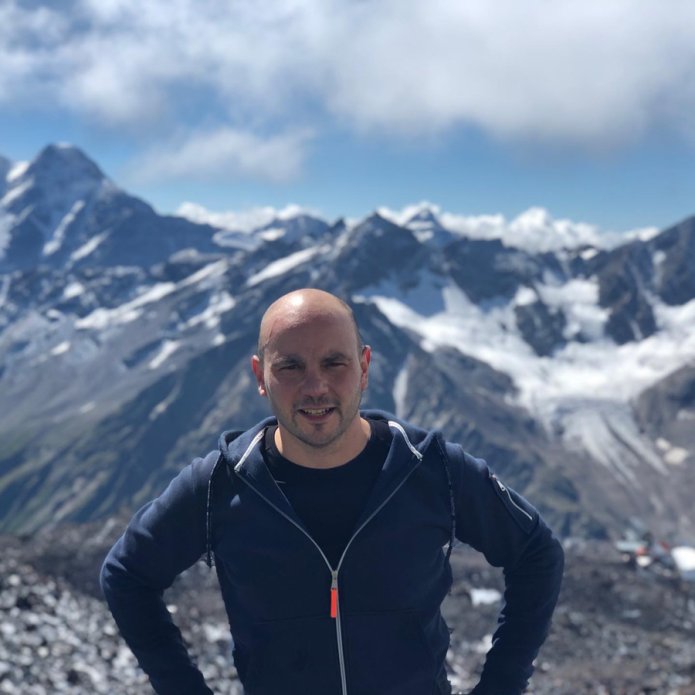
Pivovarov could hardly descend from Elbrus before he was arrested again. In September, the politician was placed in an administrative detention center for 14 days for organizing the collection of signatures in Moscow against the extension of Putin’s time in power as part of the «No!» campaign.
In 2021, an administrative case was filed against Pivovarov for participating in the activities of an «undesirable organization». The reason was that on behalf of the «Open Russia» he handed over masks and gloves to the doctors of St. Petersburg at the height of the coronavirus pandemic. However, Pivovarov continues to openly criticize Putin and does not leave Russia.
In spring, the Duma tightened the law on «undesirable organizations» — now it is possible to prosecute leaders of such organizations criminally and without administrative prejudice. Pivovarov is sure that this was done first of all in order to get rid of the «Open Russia», whichthe Kremlin is tired of. In May, the organization announced self-liquidation.
From plane to jail
After the announcement of the liquidation of «Open Russia» Pivovarov was to fly to Warsaw. According to his friends, he was not emigrating and was going to soon return to Russia. However, he was removed directly from the plane in Pulkovo after passing the border control.
The criminal case under the article on the implementation of the activities of an «undesirable organization» was started in Krasnodar, the logic being that the Facebook post in question was made from a computer in this city. In the post, the politician urged to support the electoral project «United Democrats». Pivovarov’s defense claims that the repost was made by the manager of the page Maria Kuznetsova.
«There was a repost with commentary. My lawyer and I decided at the beginning of the case to publicly declare that I made the repost. After that, the investigators had to look for 33 other posts that Andrei had actually made to make an accusation, » says Maria Kuznetsova.
As it did in 2015, Memorial, once again recognized Pivovarov as a political prisoner. The European Union urged the Kremlin to close the case, as did the director of Amnesty International for Eastern Europe and Central Asia, Marie Struthers. The world’s leading agencies and newspapers issued their own statements, e.g. The Washington Post and The Guardian.
«I think he was arrested not as simply Andrei Pivovarov, but as the head of Khodorkovsky’s organization, as his manager, » says Maxim Reznik, a former deputy of the St. Petersburg parliament.
Pivovarov is running for the State Duma from the Yabloko party directly from the pretrial detention center — not in his native Petersburg, but in Krasnodar. This is what the party decided, though the politician wanted to be nominated in Moscow. Moreover, Yabloko did not put him at the top of the party’s list. This essentially means that the oppositionist has no chance of getting a mandate. However, Pivovarov says in an interview that he is still grateful to party leader Grigory Yavlinsky for not being afraid to include a politician from the non-systemic opposition in the list of candidates.
This ability to compromise is Pivovarov’s important trait. Over the years, he also collaborated with the «Party of Growth» (which some political scientists consider a spoiler party – OVD-Info), and with «A Just Russia — for Truth». He emphasizes that he cooperates with specific people whom he considers decent, even if he does not share the organization’s political programme.
Now the politician is in a special unit — this is a solitary inside a solitary, in a cell without a TV. He has not been allowed to call his son for a year.
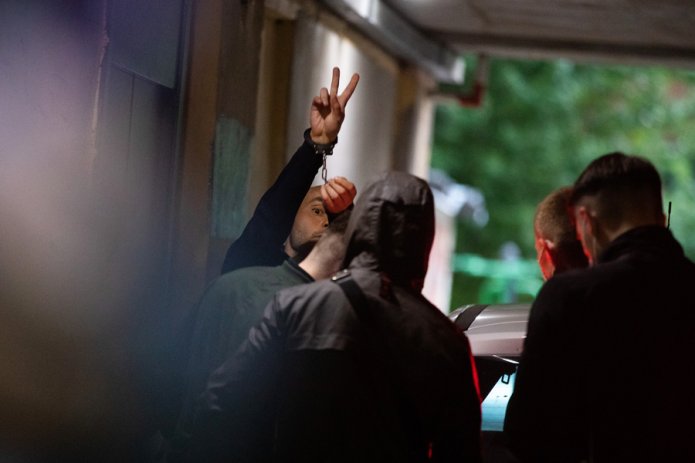
«What I stood for is a desirable, free Russia, a strong democratic state. And what we have right now has nothing to do with how people want to see our country. I am sure that our country will change and everything will be great. They cannot stop us. We will get through this, » he said in his speech after the verdict, while the bailiffs were trying to clear the room and take him to his cell.
Maria Kuznetsova says that in letters from the pretrial detention center Pivovarov writes that he reads a lot and does push-ups 400 times a day, and also runs in the exercise yard — the yard is tiny and, according to the politician himself, cellmates look at him like he is crazy. But he runs six kilometers at a time: he showed Kuznetsova calculations for different courtyards, how many circles you need to run to make six kilometers.
Behind the bars, Pivovaro dreams of meeting his son and plans a big city run in St. Petersburg. By correspondence, he has already assembled a team for a hike at Mount Everest.
«Andrei is very persistent, and a really hard worker, — Kuznetsova notes. — I work sometimes for 12 hours a day, and he always worked much more than me. Maybe he didn’t always work as efficiently as possible, but to work, to do everything to reach the goal — yes, it’s him. He made a very strict schedule for himself in the pre-trial detention center. So that there is not much free time. And Andrei, if he has decided something, he will never stop.»
Sergey Kagermazov



